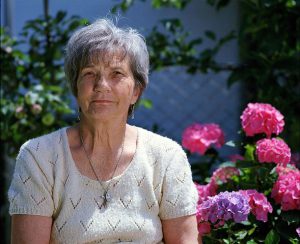Thursday
Opinion PiecesEavesdropping on the Elderly
Lessons learned by listening to our elders
by Anne-Marie Keppel
 Not all elderly are cascading fountains of wisdom. But simply because they are old and they see and do things differently than those of other ages, little life-altering gems often bubble up.
Not all elderly are cascading fountains of wisdom. But simply because they are old and they see and do things differently than those of other ages, little life-altering gems often bubble up.
New on the job as an Outings Coordinator for a group of elderly, I stood in the front of the bus, counting a sea of white and grey heads to make sure I hadn’t left anyone behind. It dawned on me then that I was counting an entire bus full of women. I smiled at all of those gorgeous women and said, “You’re all too beautiful! Where are all the men?!” And a 90-year-old woman shouted back, “They’re all dead!” The whole lot of them burst out laughing and someone shouted out, “And they call US the weaker sex!”
Years later, working in a retirement home, I came to cherish the men who had survived long enough to get there. And I wasn’t the only one. Every time a man, of any age, walked down the hall or through the dining room, every female resident who witnessed the rare spectacle grew about 6 inches, and my heavens if their wrinkles didn’t smooth out a bit. If a gentleman actually moved in to the facility, it was not uncommon for an extra layer of lipstick to be applied just before dining hours. and it was always a bit of a thing whose table he was going to sit at.
When you work in a place where people live, you try to give space and privacy where you are able. But when there there are not many common room spaces, and when the entire population is hard of hearing, private conversations are typically whisper-yelled or just straight up at decibel 10. Sometimes they are hilarious: “The cook looks better than his food!” And sometimes they’re less funny.
 I overheard two gentlemen talking one morning. One was significantly older than the other and the younger one admired the elder, since he was a WWII veteran. The two quickly became friends (being the only two men in the facility), and the younger shared that he wished he could’ve been in the war. He had wanted to serve so badly, but he had been too young. The younger gentleman then said to the older, “You’re 95. That’s a real good age to get to.” And the older man very gently said, “I’ve lost my wife, my children, my siblings, my parents, my aunts and uncles and all of my cousins. I’m the only one left.” The younger man listened, and bowed his head. He didn’t pity his new friend, did not try to console him, did feel badly for himself that he was not considered in making that comment. The older man meant nothing more than he said, and the younger man interpreted it exactly as it was meant. They just sat side by side. Gently.
I overheard two gentlemen talking one morning. One was significantly older than the other and the younger one admired the elder, since he was a WWII veteran. The two quickly became friends (being the only two men in the facility), and the younger shared that he wished he could’ve been in the war. He had wanted to serve so badly, but he had been too young. The younger gentleman then said to the older, “You’re 95. That’s a real good age to get to.” And the older man very gently said, “I’ve lost my wife, my children, my siblings, my parents, my aunts and uncles and all of my cousins. I’m the only one left.” The younger man listened, and bowed his head. He didn’t pity his new friend, did not try to console him, did feel badly for himself that he was not considered in making that comment. The older man meant nothing more than he said, and the younger man interpreted it exactly as it was meant. They just sat side by side. Gently.
 We don’t do this for each other very often. We don’t just listen. We constantly try to interpret, to further create, to seek inspiration, solution or criticism. We try to receive love or give love or fix or brush off. We don’t just listen. Though it is possible. I’ve witnessed it, but mostly only with the elderly. Emotions have run havoc through their aching bodies and minds for a near-century, and they know how to just let their mind and body and auto-responses pause. I think mostly because they are often so very tired. Yes, yes, or they flat out didn’t hear what the other person said–totally possible. But what is in a pause? A genuine pause. Pauses don’t offer confirmation of any kind. Pauses simply allow for what is. With no speculation. What is, is precious.
We don’t do this for each other very often. We don’t just listen. We constantly try to interpret, to further create, to seek inspiration, solution or criticism. We try to receive love or give love or fix or brush off. We don’t just listen. Though it is possible. I’ve witnessed it, but mostly only with the elderly. Emotions have run havoc through their aching bodies and minds for a near-century, and they know how to just let their mind and body and auto-responses pause. I think mostly because they are often so very tired. Yes, yes, or they flat out didn’t hear what the other person said–totally possible. But what is in a pause? A genuine pause. Pauses don’t offer confirmation of any kind. Pauses simply allow for what is. With no speculation. What is, is precious.
On an overnight shift once I was paged by a resident at 3:00 in the morning. I swallowed a big swig of my yerba mate, and then scurried to help her to the bathroom. Like clockwork, she paged me every night around this time so I could assist her to the toilet. It didn’t matter too much because she already had gone in her pull-up. The bathroom trip was simply to change the pull-up, and so she could keep in the habit of using the toilet. And it meant that we could chat for a moment. The chat was likely something she used to do years ago with her husband in the middle of the night. She had lost most of her memory, though, so all that remained was the habit.
 As I was tucking her back in to bed she said, “You know, I’m really worried about something.” And I asked, “Yes? What’s the problem?” Imagining she was worried about her children, or an upcoming doctor’s appointment. She said, “I’m worried that I have nothing to be worried about.” Her answer surprised me, and I had to pause before I replied. I realized that worrying to a lot of people feels productive in a way, and since she had no real idea of what was going on outside of that very moment, and everything seemed fine, she felt like she was missing something. How does one console someone who is worried about nothing? I did what I would do with a child afraid of a monster. I held her hand, and reminded her that she was fed, clothed, in a warm, safe bed, and that soon the morning birds would awaken. I knew that she would be snoring away straight through the first bird song, and have to be woken up for breakfast, but these small simple reminders of presence were enough for her to fall back to sleep.
As I was tucking her back in to bed she said, “You know, I’m really worried about something.” And I asked, “Yes? What’s the problem?” Imagining she was worried about her children, or an upcoming doctor’s appointment. She said, “I’m worried that I have nothing to be worried about.” Her answer surprised me, and I had to pause before I replied. I realized that worrying to a lot of people feels productive in a way, and since she had no real idea of what was going on outside of that very moment, and everything seemed fine, she felt like she was missing something. How does one console someone who is worried about nothing? I did what I would do with a child afraid of a monster. I held her hand, and reminded her that she was fed, clothed, in a warm, safe bed, and that soon the morning birds would awaken. I knew that she would be snoring away straight through the first bird song, and have to be woken up for breakfast, but these small simple reminders of presence were enough for her to fall back to sleep.
What is, is precious. A pause in space, in time, can free us from the worry of nothing. We can try to learn this by spending time with the slower generations of humans. Old people are cool. Pass it on.
 Anne-Marie Keppel lives in a magical dwelling in northern Vermont with her husband Pablo Coddou, three children ages 20, 16 and 2, and two guinea pigs. She is Head Teacher at Karmê Chöling’s Family Camp, is an Executive Council member of the camp, greatly loves Kasungship, and teaches tightwire as a mind/body awareness practice. Currently launching a business in Community Deathcare, Anne-Marie is a Hospice volunteer, trained death midwife, and is in school to become a Celebrant with a focus on funerals and memorials.
Anne-Marie Keppel lives in a magical dwelling in northern Vermont with her husband Pablo Coddou, three children ages 20, 16 and 2, and two guinea pigs. She is Head Teacher at Karmê Chöling’s Family Camp, is an Executive Council member of the camp, greatly loves Kasungship, and teaches tightwire as a mind/body awareness practice. Currently launching a business in Community Deathcare, Anne-Marie is a Hospice volunteer, trained death midwife, and is in school to become a Celebrant with a focus on funerals and memorials.

















Jun 1, 2018
Reply
Hi Jampa! Indeed, everyone has a story. I’m so sad that they often go untold. Here is another piece I wrote recently that perhaps you may relate to or find interesting. (you may have to cut and paste the link if it does not actively link here) Very kindly, Anne-Marie
http://stardustmeadow.blogspot.com/2018/05/normal-0-false-false-false-en-us-ja-x.html
Jun 1, 2018
Reply
Precious wisdom in the elders and in the stories. Thank you for sharing!
Jun 1, 2018
Reply
Thank you. I have been living in a small assisted living home for two years. Your piece resonates with my experience. Sometimes, families “warehouse” their elders with only the rare obligatory visits. Maybe there is bad history or extra work hours to be able to afford the elder’s care. My experience has been that these elders, including those with dementia, all have something to share.